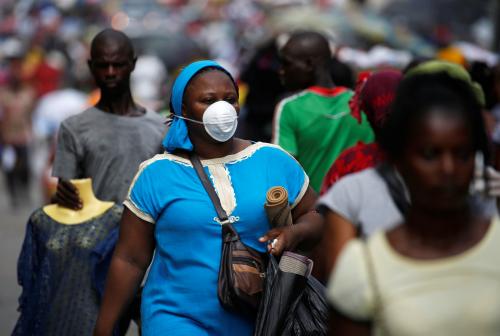Last month, Gallup released results from its World Poll, in which it examines how respondents in sub-Saharan Africa feel about the health care they receive and how they grapple with the daily challenges posed by their health. The survey is nationally representative and collected continuously from more than 150 countries, allowing for comparisons across countries and regions. Notably, this survey was conducted before the COVID-19 pandemic struck.
According to the report, a higher share of adults in sub-Saharan Africa report having health problems that keep them from doing things that people normally can do at their age than in any other region except the former Soviet Union (Table 1). Percentages are also high among the older population: 6 in 10 respondents aged 60 or older in sub-Saharan Africa report preventative health problems, which ties the region with the Middle East and North Africa for the second-highest figure. Of the 144 countries/territories surveyed in 2019, the 12 countries with the highest incidence of reported health problems were all in sub-Saharan Africa, with Chad, Guinea, Comoros, and Eswatini leading the way.
Table 1. Do you have any health problems that prevent you from doing any of the things people at your age normally can do?
Source: Gallup World Poll, 2019.
Note: Only those aged 15 and older were surveyed.
The survey also explores how respondents feel about the health care available in their communities. While just over half the adults (51 percent) surveyed in sub-Saharan Africa are dissatisfied with the quality of health care available to them, responses vary widely by country. Table 2 shows the 10 countries (including one city) with the highest proportion of adults dissatisfied with available health care. At 75 percent, Gabon has the highest rate of dissatisfaction in sub-Saharan Africa. In Mauritania, Togo, and Liberia more than two-thirds of respondents reported being dissatisfied.
Table 2. In the city or area where you live, are you satisfied or dissatisfied with the availability of quality health care?
Source: Gallup World Poll, 2019.
Note: Only those aged 15 and older were surveyed.
While sub-Saharan Africa is the youngest continent on the planet, its relative youth does not seem to preclude its citizens from health challenges. Indeed, the results of this survey suggest that disabling health problems appear to be more widespread there than other world regions. Notably, as the world is quickly finding out, chronic illnesses often render those consigned to bear them more vulnerable to the coronavirus. This fact, compounded by the region’s lagging health infrastructure, has led experts to suggest that a hard, wide hit by COVID-19 in the region could be devastating.
For further discussion on how COVID-19 is impacting health care systems and economies in Africa, consult “Strategies for coping with the health and economic effects of the COVID-19 pandemic in Africa” by Brahima S. Coulibaly and Payce Madden. For discussion of how the public views the spread of COVID-19 in Africa, see “Figures of the week: Perceptions of COVID-19 in South Africa, Kenya, and Nigeria” by Payce Madden.








Commentary
Figures of the week: Perceptions of health in sub-Saharan Africa before the pandemic
May 21, 2020